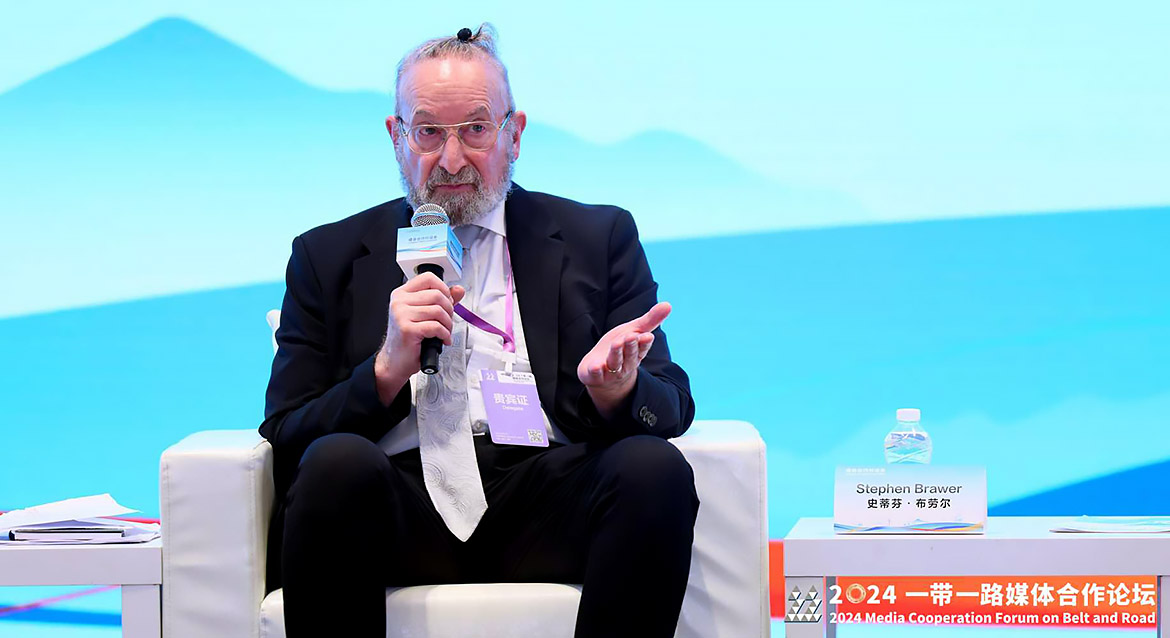In the interview with Stephen Brawer, the president of the Belt and Road Institute in Sweden (BRIX Sweden), conducted by Bencsik Dávid for Magyar Demokrata, Brawer offers deep insights into the Belt and Road Initiative (BRI) and critiques the prevailing Western narrative on global economic developments.
The conversation highlights how the BRI reflects a fundamental shift in international relations and development, away from the colonial legacies of the past and towards a more cooperative, multilateral future.
China’s Rise and the Belt and Road Initiative
Brawer emphasizes that China’s rise as an economic powerhouse is rooted in its long history, stretching back centuries when it was one of the most advanced civilizations in the world. After enduring colonial oppression during the Opium Wars and subsequent decades, China has re-emerged through policies implemented under Xi Jinping.
These policies have transformed China from an impoverished state to a major global economic player. According to Brawer, this transformation has global implications, particularly for developing nations, as the Belt and Road Initiative offers them a way out of poverty through modern infrastructure projects and partnerships based on mutual benefit rather than exploitation.
Brawer describes the BRI as an alternative to the traditional Western economic model, which he views as inherently colonial and exploitative. He notes that while Western powers historically used force to assert control over developing nations, China’s approach through the BRI is peaceful and voluntary, offering partnerships that respect national sovereignty.
Related: David Bencsik, Hungary: A New Force Standing up for Sovereignty in Europe is Growing Stronger
He said, ”China has emerged and taken its rightful place as one of the great civilizations to a leading role in the world.” He argues that the BRI facilitates a new paradigm in international relations, aiming to establish a ”Community for a Shared Future for Mankind” where economic development is cooperative and inclusive.
The West’s Response: Criticism and Misinformation
Dávid raises the point that many in the West, particularly in mainstream media, accuse China of ”debt-trap diplomacy” through the BRI, implying that the initiative burdens poorer nations with unsustainable debts.
Brawer dismisses these claims as propaganda designed to protect the dominance of Western financial systems. He contends that the accusations lack substance and are part of a broader effort to discredit China’s growing influence.
According to Brawer, the Western media serves as a mouthpiece for the Anglo-American power structure, which he believes is resistant to any shift in the global economic order that would undermine its control.
Brawer notes that the real fear in Western capitals is not China’s rise per se, but the potential for China to offer developing nations an alternative model that challenges the global financial system dominated by the West.
He critiques the speculative nature of the Western financial system, calling it ”neo-Malthusian” and accusing it of perpetuating poverty and inequality globally. In contrast, the BRI represents a more sustainable and equitable model for global development.
Europe’s Role and Sovereignty
The interview touches on Europe’s complex relationship with China. Brawer suggests that Europe has much to gain from cooperating with China, primarily through the BRI. However, he argues that the European Union, influenced by the United States and NATO, has hindered individual nations from pursuing their sovereign interests in engaging with China.
He cites Hungary and Serbia as examples, which have taken more independent stances by embracing BRI projects such as the Budapest-Belgrade railway.
He believes that if European nations could regain their sovereignty and break free from EU and NATO dictates, they could play a crucial role in global development, particularly in collaboration with China.
Brawer also points out that European economies heavily depend on trade with China, making it impractical for Europe to sever ties despite political pressures.
He remains hopeful that Europe will eventually recognize the benefits of deeper cooperation with China, moving towards a more multipolar world order where economic relations are defined by mutual benefit rather than hegemonic control.
The Future of Global Economic Development
Looking to the future, Brawer is optimistic about the potential for global economic transformation through the BRI. He believes that developing nations, particularly in Africa and the global South, stand to benefit significantly from Chinese-led infrastructure projects, which could help eradicate poverty and foster modernization.
He contrasts this vision with the stagnation and inequality perpetuated by the current Western-led economic system. For Brawer, the BRI represents not just an economic initiative but a new way of thinking about international relations—prioritizing shared prosperity over competition and conflict.
Brawer reiterates his belief that the BRI is a critical step towards breaking free from the colonial legacies that continue to shape global economic relations.
He calls for greater understanding and engagement with China’s vision for a shared future, which he argues is in the best interest of both developing nations and developed economies like those in Europe. He hopes that as more countries recognize the benefits of the BRI, the current geopolitical tensions will give way to a more cooperative and peaceful global order.
In this wide-ranging interview, Brawer compellingly defends the Belt and Road Initiative as a vehicle for global development and critiques the Western economic system’s reliance on outdated, imperialistic models. His insights underscore the importance of rethinking international cooperation in the 21st century, focusing on equity, development, and mutual respect.
Related
- BRNN.com: The Belt and Road News Network
- Demokrata.hu: Magyar Demokrata
- NewsVoice: David Bencsik, Hungary: A New Force Standing up for Sovereignty in Europe is Growing Stronger


